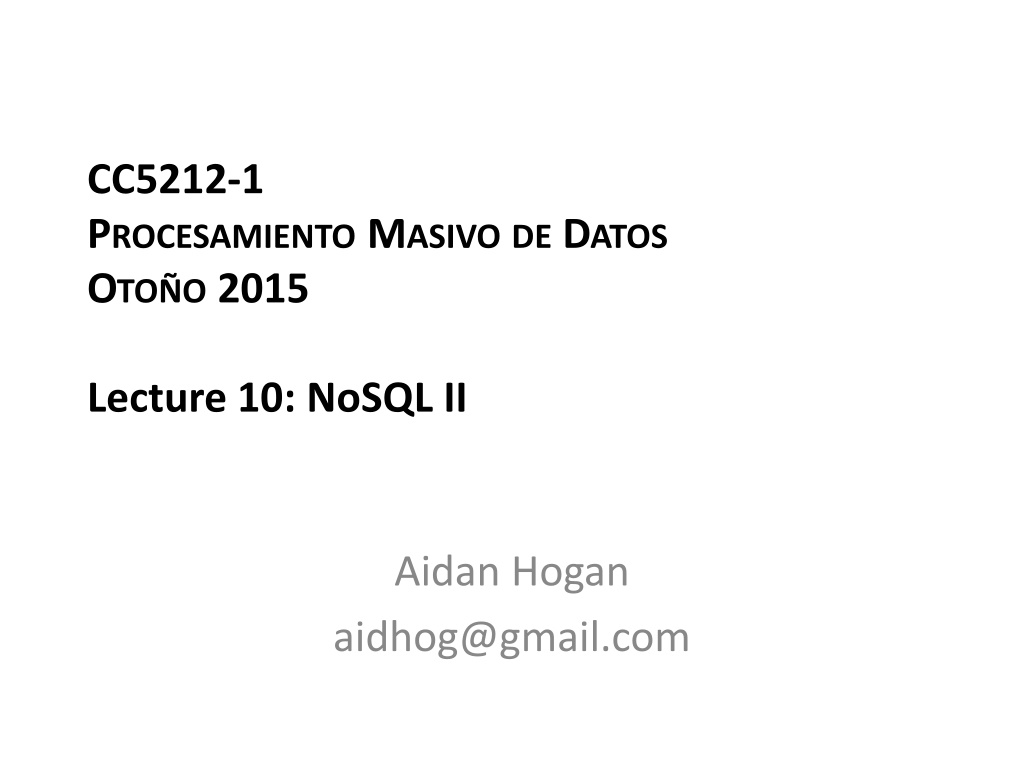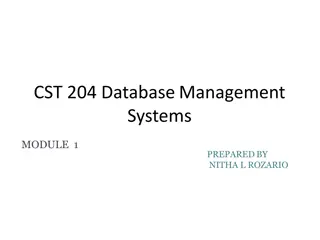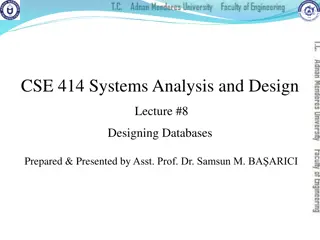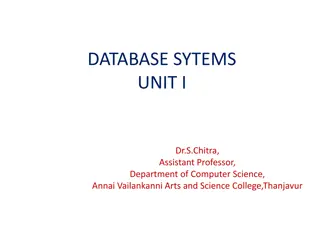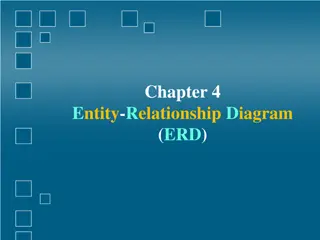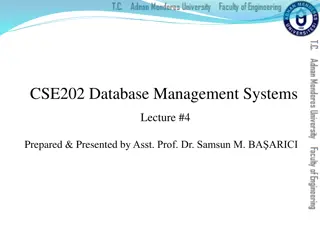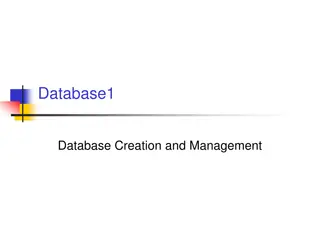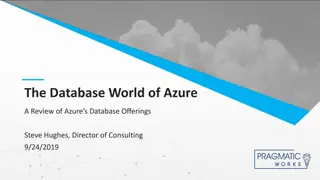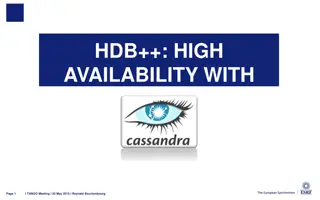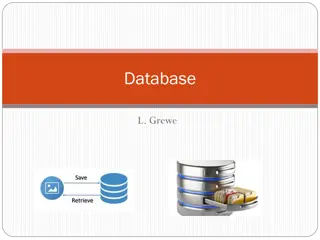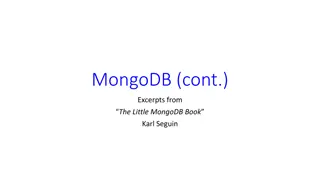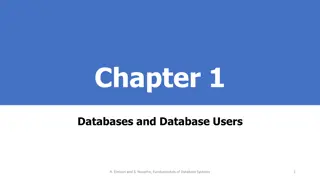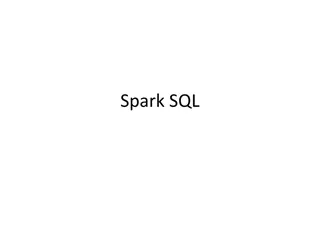Exploring NoSQL Systems and Database Models in Data Processing
Delve into the realm of NoSQL databases and their differences with relational databases. Discover the landscape of database models, including key-value and document stores, along with insights on Amazon DynamoDB's object versioning system.
Download Presentation

Please find below an Image/Link to download the presentation.
The content on the website is provided AS IS for your information and personal use only. It may not be sold, licensed, or shared on other websites without obtaining consent from the author. Download presentation by click this link. If you encounter any issues during the download, it is possible that the publisher has removed the file from their server.
E N D
Presentation Transcript
CC5212-1 PROCESAMIENTO MASIVO DE DATOS OTO O 2015 Lecture 10: NoSQL II Aidan Hogan aidhog@gmail.com
NoSQL vs. Relational Databases What are the big differences between relational databases and NoSQL systems? What are the trade-offs?
The Database Landscape Batch analysis of data Not using the relational model Using the relational model Real-time Stores documents (semi-structured values) Relational Databases with focus on scalability to compete with NoSQL while maintaining ACID Not only SQL Maps Column Oriented Cloud storage Graph-structured data In-Memory
KeyValue = a Distributed Map Key Value country:Afghanistan capital@city:Kabul,continent:Asia,pop:31108077#2011 country:Albania capital@city:Tirana,continent:Europe,pop:3011405#2013 city:Kabul country:Afghanistan,pop:3476000#2013 city:Tirana country:Albania,pop:3011405#2013 user:10239 basedIn@city:Tirana,post:{103,10430,201}
Amazon Dynamo(DB): Model Named table with primary key and a value Countries Primary Key Value Afghanistan capital:Kabul,continent:Asia,pop:31108077#2011 Albania capital:Tirana,continent:Europe,pop:3011405#2013 Cities Primary Key Value Kabul country:Afghanistan,pop:3476000#2013 Tirana country:Albania,pop:3011405#2013
Amazon Dynamo(DB): Object Versioning Object Versioning (per bucket) PUT doesn t overwrite: pushes version GET returns most recent version
KeyValue Stores: Values are Documents Key Value <country> <capital>city:Kabul</capital> <continent>Asia</continent> <population> <value>31108077</value> <year>2011</year> </population> </country> country:Afghanistan Document-type depends on store XML, JSON, Blobs, Natural language Operators for documents e.g., filtering, inv. indexing, XML/JSON querying, etc.
MongoDB: JSON Based Key Value (Document) { _id : ObjectId( 6ads786a5a9 ) , name : Afghanistan , capital : Kabul , continent : Asia , population : { value : 31108077, year : 2011 } } 6ads786a5a9 o Can invoke Javascript over the JSON objects Document fields can be indexed db.inventory.find({ continent: { $in: [ Asia , Europe ]}})
KeyValue = a Distributed Map Countries Primary Key Value Afghanistan capital:Kabul,continent:Asia,pop:31108077#2011 Albania capital:Tirana,continent:Europe,pop:3011405#2013 Tabular = Multi-dimensional Maps Countries Primary Key capital continent pop-value pop-year Afghanistan Kabul Asia 31108077 2011 Albania Tirana Europe 3011405 2013
Bigtable: The Original Whitepaper Why did they write another paper? MapReduce solves everything, right? MapReduce authors
Bigtable: Data Model a sparse, distributed, persistent, multi- dimensional, sorted map. sparse: not all values form a dense square distributed: lots of machines persistent: disk storage (GFS) multi-dimensional: values with columns sorted: sorting lexicographically by row key map: look up a key, get a value
Bigtable: in a nutshell (row, column, time) value row: a row id string e.g., Afganistan column: a column name string e.g., pop-value time: an integer (64-bit) version time-stamp e.g., 18545664 value: the element of the cell e.g., 31120978
Bigtable: in a nutshell (row, column, time) value (Afganistan,pop-value,t4) 31108077 Primary Key capital continent pop-value pop-year t1 t2 t4 t1 t3 31143292 t1 2009 Afghanistan t1 Kabul t1 Asia 31120978 31108077 t4 t1 t3 2011 2912380 2010 Albania t1 Tirana t1 Europe 3011405 2013
Bigtable: Sorted Keys Primary Key capital pop-value pop-year t1 t2 t4 31143292 t1 2009 Asia:Afghanistan t1 Kabul 31120978 S O R T E D 31108077 t4 2011 Asia:Azerbaijan t1 t3 2912380 t1 t3 2010 Europe:Albania t1 Tirana 3011405 2013 Europe:Andorra Benefits of sorted keys vs. hashed keys?
Bigtable: Tablets Primary Key capital pop-value pop-year t1 t2 t4 31143292 t1 2009 A S I A Asia:Afghanistan t1 Kabul 31120978 31108077 t4 2011 Asia:Azerbaijan t1 t3 2912380 t1 t3 2010 E U R O P E Europe:Albania t1 Tirana 3011405 2013 Europe:Andorra Take advantage of locality of processing!
Bigtable: Distribution Pros and cons versus hash partitioning? Split by tablet Horizontal range partitioning
Bigtable: Column Families Primary Key pol:capital demo:pop-value demo:pop-year t1 t2 t4 31143292 t1 2009 Asia:Afghanistan t1 Kabul 31120978 31108077 t4 2011 Asia:Azerbaijan t1 t3 2912380 t1 t3 2010 Europe:Albania t1 Tirana 3011405 2013 Europe:Andorra Group logically similar columns together Accessed efficiently together Access-control and storage: column family level If of same type, can be compressed
Bigtable: Versioning Similar to Apache Dynamo (so no fancy slide) Cell-level 64-bit integer time stamps Inserts push down current version Lazy deletions / periodic garbage collection Two options: keep last n versions keep versions newer than t time
Bigtable: SSTable Map Implementation How to handle writes? 64k blocks (default) with index in footer (GFS) Index loaded into memory, allows for seeks Can be split or merged, as needed Primary Key pol:capital demo:pop-value demo:pop-year t1 t2 t4 31143292 0 t1 2009 Asia:Afghanistan t1 Kabul 31120978 31108077 t4 2011 Asia:Azerbaijan Asia:Japan 65536 Asia:Jordan Block 0 / Offset 0 / Asia:Afghanistan Index: Block 1 / Offset 65536 / Asia: Japan
Bigtable: Buffered/Batched Writes What s the danger here? Merge-sort READ Memtable In-memory GFS Tablet log SSTable1 SSTable2 SSTable3 WRITE Tablet
Bigtable: Redo Log If machine fails, Memtable redone from log Memtable In-memory GFS Tablet log SSTable1 SSTable2 SSTable3 Tablet
Bigtable: Minor Compaction When full, write Memtable as SSTable Memtable Memtable In-memory GFS Tablet log SSTable1 SSTable2 SSTable3 SSTable4 Tablet
Bigtable: Merge Compaction Merge some of the SSTables (and the Memtable) READ Memtable Memtable In-memory GFS Tablet log SSTable1 SSTable2 SSTable3 SSTable1 SSTable4 Tablet
Bigtable: Major Compaction Merge all SSTables (and the Memtable) Makes reads more efficient! READ Memtable In-memory GFS Tablet log SSTable1 SSTable2 SSTable3 SSTable1 SSTable1 SSTable4 Tablet
Bigtable: Consistency CHUBBY: Distributed consensus tool based on PAXOS Maintains consistent replicas Five replicas: one master and four slaves Co-ordinates distributed locks Stores location of main root tablet Do we think it s a CP system or an AP system?
Bigtable: A Bunch of Other Things Locality groups: Group multiple column families together; assigned a separate SSTable Select storage: SSTables can be persistent or in-memory Compression: Applied on SSTable blocks; custom compression can be chosen Caches: SSTable-level and block-level Bloom filters: Find negatives cheaply
Reject empty queries using very little memory! Aside: Bloom Filter Create a bit array of length m (init to 0 s) Create k hash functions that map an object to an index of m (even distribution) Index o: set m[hash1(o)], , m[hashk(o)] to 1 Query o: anym[hash1(o)], , m[hashk(o)] set to 0 = not indexed allm[hash1(o)], , m[hashk(o)] set to 1 = might be indexed
Bigtable: an idea of performance Values are 1 kilobyte in size Results from 2006 paper Why are random (disk) reads so slow? The read sizes are 1 kb, but a different 64 kb block must be sent over the network (almost) every time
Bigtable: an idea of performance Values are 1 kilobyte in size Results from 2006 paper Average values/second per server: Adding more machines does add a cost! But overall performance does increase
Bigtable: Apache HBase Open-source implementation of Bigtable ideas
The Database Landscape Batch analysis of data Not using the relational model Using the relational model Real-time Stores documents (semi-structured values) Relational Databases with focus on scalability to compete with NoSQL while maintaining ACID Not only SQL Maps Column Oriented Cloud storage Graph-structured data In-Memory
Data = Graph Any data can be represented as a directed labelled graph (not always neatly)] When is it a good idea to consider data as a graph? When you want to answer questions like: How many social hops is this user away? What is my Erd s number? What connections are needed to fly to Perth? How are Einstein and Godel related?
Graph Databases (Fred,IS_FRIEND_OF,Jim) (Fred,IS_FRIEND_OF,Ted) (Ted,LIKES,Zushi_Zam) (Zuzhi_Zam,SERVES,Sushi)
